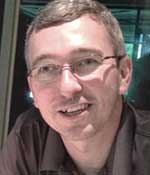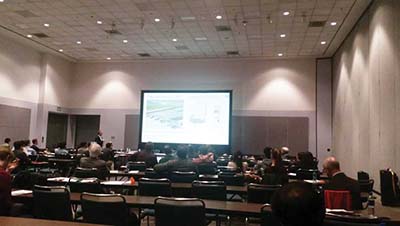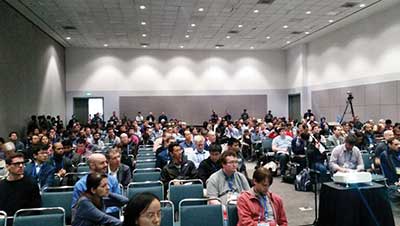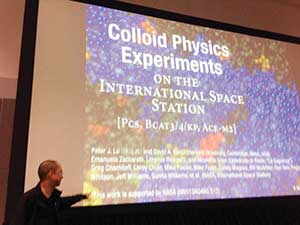March 2018: Los Angeles Full of Stars From the World of Physics and the Movies

In early March 2018, Los Angeles was full of great scientists and Oscar goers. I’m sure many of our members found it hard to resist Hollywood and the red carpet, but maybe a few were chased into the safety of the Los Angeles Convention Center by the paparazzi.
GERA Workshop
The Forum for Early Career Scientists (FECS) had a very active meeting; so active, we started before the meeting! On the Sunday before the main event, the forum proudly partnered with the topical Group on Energy Research and Applications (GERA) and held a workshop focused on “The Future of Sustainable Approaches to Energy”. The workshop consisted of a series of talks by leading experts in the field, lunch with the experts, and a panel discussion. We were fortunate to have Prof. Peter F. Green, the Chief Research Officer for the National Renewable Energy Laboratory, give the opening keynote address. He was followed by George Crabtree (Argonne), Bai-Xiang Xu (Technische Universität Darmstadt), and Amy Prieto (Colorado State) before a break for lunch. After lunch, the workshop continued with Nate Lewis (Caltech), Sue Carter (University of California), Reuben Collins (Colorado School of Mines), and Todd Monson (Sandia) giving very interesting talks. Over 80 early career scientists were able to mix with these eminent scientists throughout the day. The successful workshop ended with an informal reception sponsored by the Journal on Renewable and Sustainable Energy before most participants headed to the APS registration booths.

GERA workshop
Session Co-sponsored with FIAP
FECS cosponsored two sessions during the week. On Wednesday the 7th, we joined the Forum on Industrial and Applied Physics (FIAP) at the start of their Industry Day. This year’s Industry Day theme was “Big Data and Physics: Bits to Knowledge”. Our co-sponsored session, entitled “Data Science as the Driving Force for Modern Industrial Physics”, featured vibrant and enthusiastic speakers from industry and academia who discussed the mining and use of large datasets. Speakers included Neil Johnson from University of Miami, Sergey Yurgenson from DataRobot and St. Petersburg State University, Bryce Meredig from Citrine Informatics, and David Purdy from Uber. Unfortunately, Sundeep Das from Netflix couldn’t join us in LA as advertised. Neil Johnson was awarded with the Joseph A. Burton Forum Award by the APS at this meeting. This dynamic session ended with many questions from early career scientists wondering if data science is in their future.

session co-sponsored with FIAP
Session Co-sponsered with FIP
On the final day of this year’s meeting, the FECS co-sponsored a session with the Forum on International Physics (FIP) about science out of this world. The lunch time session, entitled “Condensed Matter Experiments Onboard the International Space Station”, had five invited speakers that enthusiastically delivered to the audience their work on getting experiments into space. Joe MacClennan (University of Colorado, Boulder), Eric Furth (University of Delaware), Peter Lu (Harvard University), John Goree (University of Iowa), and Rob Thompson (Nasa, Jet Propulsion Lab) discussed their work on colloids, plasmas, fluids and ultracold atoms on the ISS. The speakers relayed the difficulties they encountered performing what are relatively easy experiments on Earth in the limited ISS workspace, within weight limitations and with the help of a busy, enthusiastic astronaut or cosmonaut instead of a bright young graduate student.

session co-sponsored with FIP
The March 2018 meeting had over 10,000 registered attendees. Not all could attend these excellent sessions organized and co-sponsored by FECS. The executive committee hopes that all those who did attend enjoyed the sessions. We are always open to ideas for future sessions, and we encourage ideas to be posted on our Facebook page or emailed to the chair-elect.
Of course, the APS meetings are not only about listening to exciting talks, but also about opportunities to network and to start conversations that might become long-lasting friendships or collaborations. To encourage this, the FECS co-hosted two receptions during the March meeting with our friends from FIP and FIAP. These events were well attended, with members overflowing into the corridors and FECS members who mingled with scientists from all over the world: from China and Iran, to Turkey and South Africa. The FECS was proud to see such a diverse and esteemed group of international APS members come together and celebrate the lasting global connections and collaboration our fields have to offer.
The 2019 March meeting is now being planned, and the executive team imagines that we will be hosting similar activities in Boston. We hope to see many of our members in our sessions, at our receptions, or participating in the Energy workshop. If you are interested in assisting the FECS in organizing such events, engaging with young researchers in the early stages of their careers, and/or encouraging international collaborations, be aware that we are looking for executive members. In the fall of 2018, we will be looking for candidates and holding elections. Please look out for this.
After obtaining his Ph.D. at Warwick University in the UK, Jason worked for several national laboratories in North America before moving to Sydney, Australia in 2013. From Sydney, he manages a group of five people performing neutron scattering at ANSTO, Australia, and around the world. He is currently the Neutron Group Leader at the National Synchrotron Radiation Research Center, Taiwan. His scientific interests are primarily in frustrated magnets, but he’s also performed research in many areas of condensed matter over thirty years of research. He has published over 120 papers and in 2008 was made a fellow of the Institute of Physics (UK). Jason was also a member-at-large of the APS Forum on International Physics from 2015 to 2017.
